Why Matheo Would Benefit from an Autism Service Dog?
Matheo’s Story
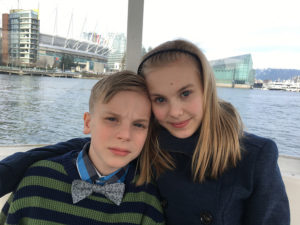
Matheo and Sascha
From early on we noticed that Matheo had a different kind of mind. He was an extremely active little guy always looking for ways to move, jump and climb. On our walks in the neighbourhood when Matheo was two, he would examine all the manhole covers and watch apartment garage doors going up and down endlessly. He had a fascination with how things worked.
Matheo developed language early and had an unusually large vocabulary for his age. He demonstrated an early affinity for transportation and bridges. By age three he was able to identify most of the bridges in Greater Vancouver and wanted us to continually talk with him about bridges while in the car. He would ask if we were going on the Granville Bridge, Burrard Bridge, Port Mann etc. We knew that this ability to memorize bridges at such a young age was unique and not something we had witnessed in his sister or his same aged cousins. It was at this time that we had an inkling that Matheo might have autism.
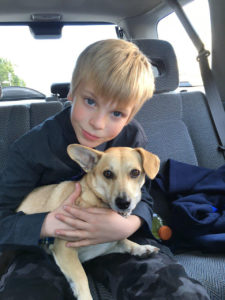
Matheo and a friend’s dog, Bailey.
Matheo sought out deep pressure stimulation such as crawling under area rugs, getting under cushions and having his sister sit on them. As a toddler he would run full speed into our legs and crash his body into furniture. He climbed everything he could from kitchen counters to high shelving units. We had to watch him constantly to keep him safe. He craved firm holding, hugging and squeezing and when highly anxious, this deep pressure had a calming effect on him.
Matheo has always shown a love of all animals (and insects), but especially dogs. As a toddler he would approach every dog we came across; big or small, fluffy, wet, old or young. He would always try to hug the dog, try to place his body under the dog and would often even try to ride them; to the chagrin of the dog’s owner. We now realize he was trying to seek deep pressure from the dog.
We enrolled Matheo in kindergarten and quickly learned that he wasn’t ready to be in a classroom. The sensory input was too much for him to process and he was not able to interact with his peers in a productive or safe manner. Matheo’s anxiety was so high at school that we decided to keep him home. We knew that it was time for him to have an autism assessment.
At age six Matheo was assessed at Sunnyhill Hospital in Vancouver. The doctor advised that Matheo didn’t fit in the autism spectrum and one of the reasons was that he had reciprocal conversationwith the doctor.
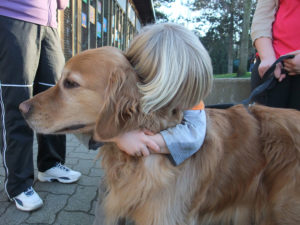
Dog hugging
The missing piece in the assessment was the socialization aspect. Sunnyhill did not see him with his peers on the playground or at school. Matheo struggled greatly to connect and interact with his peers. His unconventional attempts to initiate play were not understood by his peers. He would often approach other children and try to hug them or attempt to lift them up as if saying, “Want to play?” His peers often ran away from him and started to avoid him. Any type of play with his peers often resulted in conflict. Matheo could communicate well with adults who could converse on his level about the world of ideas, but his peers were left confused and frustrated by his conversation and frenzied antics and could not relate to him. His socialization skills were very much atypical.
Matheo was later diagnosed at age seven with Autism by a child psychologist in Vancouver who was able to witness Matheo interacting with his peers. The autism diagnosis was a relief in a way. It explained his atypical behaviours and development and enabled him to get the proper support to attend school.
Matheo has always had a thirst for knowledge. When he was six he asked, “If I ran the speed of light would I still have a shadow?” We still have yet to give him a proper answer. Matheo talks constantly, asks questions, talks to strangers, opines incessantly, and then some!
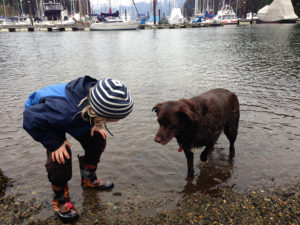
Bowen Island
As verbal a child as Matheo has always been, he still suffers from a processing disorder. People usually assume he can process language at the same speed as he speaks. He cannot. Simple directions often have to be repeated to him as he is generally hyperfocused on his own thoughts instead of the world around him. He also does not process information in a typical manner. It makes for some rather interesting and random proclamations but it can cause problematic interaction with his peers and the external world. One parent at a playground even once threatened, “If you don’t teach that child some respect, I will.”
Matheo has never fit in with other children except his sister who is unbelievable at accommodating his idiosyncrasies. Matheo has had frequent struggles at the park, at preschool and at elementary school. He pushed, hit, and even bit. He has screamed and cried; usually in frustration at not knowing how to interact, but also in anxiety due to feeling misunderstood and unaccepted.
Matheo does not have real friends at school. He has yet to be invited to a classmate’s birthday party. Without the aid of his School Support Worker (SSW), his interaction with peers is often unsuccessful.
At age nine Matheo asked, “Do you think I have a lot of autism or a little bit?” Before giving our opinion, we asked him what he thought and he replied, “I think I have a little bit of autism but I have the most autism at recess.”
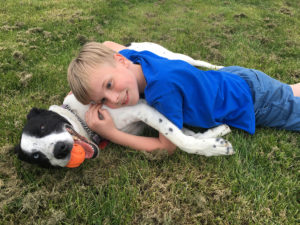
Dog hugging
Matheo is particularly sensitive to sensory input including smells, touch and noise. Hand clapping is like nails on a chalkboard to him. He continues to seek deep pressure. Going out in the community can be a challenge and we tend to avoid noisy restaurants, movie theatres and public transit.
In grades 1, 2 and 3 Matheo attended public school intermittently depending on his anxiety level and support worker status. His grade 4 teacher noted that Matheo was only able to be in the class independently for 3 to 5 minutes while his SSW was out of the classroom. He is currently in grade 5 and receives full-time individual support. Matheo needs frequent sensory breaks and time spent away from the classroom in a quieter environment. Just recently his SSW was sick and the school was unable to find a replacement and we could not send him to school. Support is especially required on the playground to guide interactions and play with other children.
Matheo continues to struggle at school socially but his love for animals, especially dogs, continues unabated. Based on research and the individual training specifically geared to the child’s needs, we feel that Matheo would benefit greatly from an Autism Service Dog by:
- Providing companionship.
- Providing happiness and enjoyment.
- Easing his social anxiety.
- Easing sensory overload.
- Reducing stress in public places (e.g. public transit, grocery stores).
- Reducing flight risk (e.g. the school he attends still considers this a possibility when he isdysregulated).
- Facilitating interactions with his peers.
- Facilitating interactions with his environment as he becomes a teenager and seeks more independence (e.g. he talks to anyone and doesn’t understand the danger this could pose).
- Strengthening his responsibility skills by caring for another being and having to think beyond hisimmediate inward focus.
- Character building (e.g. he is unable to play team sports and thus does not get the experience thatthose lessons provide).
-
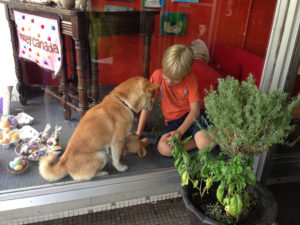
Nice to meet you
Providing deep pressure stimulus (a skill Autism Service Dogs are capable of).
We are very grateful to have discovered Autism Service Dogs and due to the high level of training they receive (BC Government Certification) Matheo would greatly benefit from having an Autism Service Dog. When Matheo has previously been given responsibility to care for a dog for a few hours he has always taken great care of its wellbeing, even picking up after it. He is extremely happy when he is in the company of a dog.
Thank you very much for your consideration in helping Matheo get an Autism Service Dog. Any and all support will be greatly appreciated. Matheo has the potential to do great things with his life but he requires some special support to achieve his potential. Your contribution to this fund will help make Matheo be the best person he can be. Despite Matheo’s challenges our expectations for his future contributions to the world are great.
%
